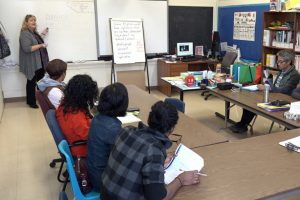Loyola offers programs to help new Canadians that are looking to learn or improve their English skills. English as a Second Language (ESL) is offered at no cost to eligible newcomers at the Loyola campus on Harriet Street in Belleville. The programs are offered in partnership with Quinte Immigration Services (QUIS).
 In addition to language skills, ESL students will meet and socialize with other newcomers from other countries and will learn about Canadian customs and culture.
In addition to language skills, ESL students will meet and socialize with other newcomers from other countries and will learn about Canadian customs and culture.
The ESL program offered by QUIS is a great way to get skills and connections that will help ease your transition in your new home.
Courses are offered in-class with direct teacher support and instruction, online with teacher support and facilitation, or in a workplace setting, through co-op and Return, Earn, and Learn.
Tips to learn English
Here are a series of tips for learning English, or any other language for that matter. These are tips that are adapted from different sources on the Internet:
- Know why you’re learning the language: If you always keep in mind why you’re learning the language-to make friends, get a better job, enjoy your life in Canada more etc., it is easier to stay motivated.
- Jump in: Whatever method(s) you use to learn a language, it is important to surround yourself in that language every day. You can listen to English on the radio, write e-mails in it. Use every opportunity to practice.
- Find a partner: Just as some people go to the gym with a “buddy”, having a language “buddy” is helpful, too. You can keep each other motivated and push each other a bit. A little bit of competition is good!
- Keep it relevant: You have to keep reminding yourself that the reason you are learning the language is to communicate with others in real-life situations. Always remembering this can help you from losing your focus or getting too wrapped up in textbooks, for example.
- Make it enjoyable: Try to do enjoyable things with the language you are learning. For example, you can try writing a poem, drawing a comic strip, writing a song. If it’s not enjoyable, you might not continue.
- Be like a child: Children are not necessarily better language learners than adults, but they have some qualities that make it easier: they are not self-conscious about making mistakes, they treat it like a game and they are not inhibited. If we can give up our fear of making mistakes and wondering what others will think if we make a mistake, we will be more relaxed and better learners.
- Get out of your “comfort zone”: Do things in the language that make you slightly uncomfortable, speak with strangers, try to order food in the language etc. By doing this, you will feel more comfortable to try more. You have to push yourself a bit and overcome your fears.
- Listen: Before you can speak any language, you have to listen to it first. You have to hear unfamiliar sounds many times before you are able to make them yourself. If you listen long enough, you will hear how these sounds are supposed to be pronounced.
- Watch native speakers talking: Language is a physical act. If you closely watch native speakers speaking their language, you will see how they move their mouths, lips etc. when they make certain sounds. If you can’t find any native speakers, watch foreign language movies or TV shows.
- Talk to yourself: If you can’t find anyone to talk to, talk to yourself in the target language. That is a good way to remember new phrases.
Related Links:






